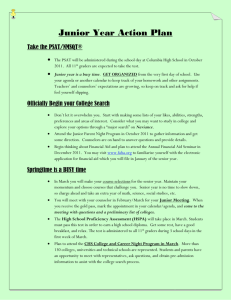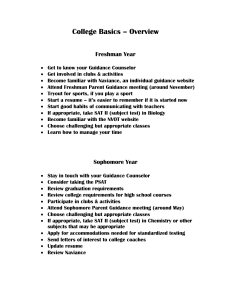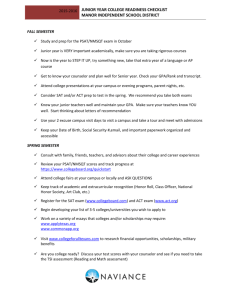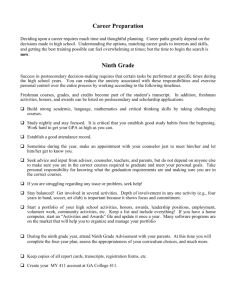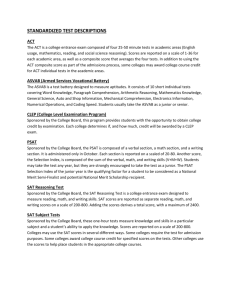JUNIOR YEAR TIME LINE - Lexington Public Schools
advertisement
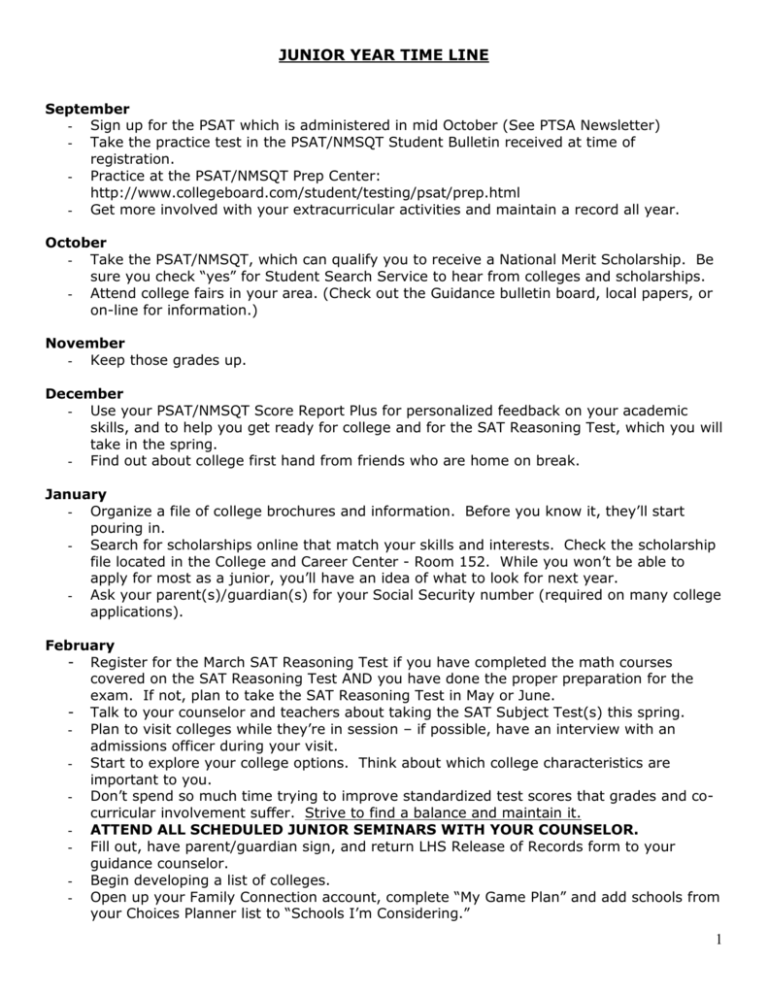
JUNIOR YEAR TIME LINE September - Sign up for the PSAT which is administered in mid October (See PTSA Newsletter) - Take the practice test in the PSAT/NMSQT Student Bulletin received at time of registration. - Practice at the PSAT/NMSQT Prep Center: http://www.collegeboard.com/student/testing/psat/prep.html - Get more involved with your extracurricular activities and maintain a record all year. October - Take the PSAT/NMSQT, which can qualify you to receive a National Merit Scholarship. Be sure you check “yes” for Student Search Service to hear from colleges and scholarships. - Attend college fairs in your area. (Check out the Guidance bulletin board, local papers, or on-line for information.) November - Keep those grades up. December - Use your PSAT/NMSQT Score Report Plus for personalized feedback on your academic skills, and to help you get ready for college and for the SAT Reasoning Test, which you will take in the spring. - Find out about college first hand from friends who are home on break. January - Organize a file of college brochures and information. Before you know it, they’ll start pouring in. - Search for scholarships online that match your skills and interests. Check the scholarship file located in the College and Career Center - Room 152. While you won’t be able to apply for most as a junior, you’ll have an idea of what to look for next year. - Ask your parent(s)/guardian(s) for your Social Security number (required on many college applications). February - Register for the March SAT Reasoning Test if you have completed the math courses covered on the SAT Reasoning Test AND you have done the proper preparation for the exam. If not, plan to take the SAT Reasoning Test in May or June. - Talk to your counselor and teachers about taking the SAT Subject Test(s) this spring. - Plan to visit colleges while they’re in session – if possible, have an interview with an admissions officer during your visit. - Start to explore your college options. Think about which college characteristics are important to you. - Don’t spend so much time trying to improve standardized test scores that grades and cocurricular involvement suffer. Strive to find a balance and maintain it. - ATTEND ALL SCHEDULED JUNIOR SEMINARS WITH YOUR COUNSELOR. - Fill out, have parent/guardian sign, and return LHS Release of Records form to your guidance counselor. - Begin developing a list of colleges. - Open up your Family Connection account, complete “My Game Plan” and add schools from your Choices Planner list to “Schools I’m Considering.” 1 March - ATTEND ALL SCHEDULED JUNIOR SEMINARS WITH YOUR COUNSELOR. - Encourage your parent(s)/guardian(s) to attend Junior Parent Workshop and open up their own Family Connection account. - Write, telephone, or email to request admissions and financial aid information from the colleges on your list. There is no charge and no obligation to obtain general information about admissions and financial aid. - Ask your counselor about the ACT and determine if it might be appropriate for you. Throughout the spring, continue to utilize Family Connection to update your list of schools. Stay in touch with your counselor to discuss course selection and your future plans, whether they include post-secondary education, the military, work or a “gap year.” Visit schools in the area just to get a sense of what a college campus is like. Take advantage of your location – there are 2 and 4 year, public and private, liberal arts and specialty colleges a mere T ride away! April - When selecting senior year courses, be sure to continue to challenge yourself academically, but realistically. - Register for the May/June SAT Reasoning Test and/or the May/June SAT Subject Test(s). - Look into summer jobs or apply for special academic or enrichment programs. - Take the ACT, if appropriate. - Attend local college fairs. May - Take the AP, ACT, SAT Reasoning Test, and/or SAT Subject Test(s), if appropriate. June - Talk to teachers about writing letters of recommendation for you. - Take the ACT, SAT Reasoning Test and SAT Subject Test(s), if appropriate. - Finalize your summer plans. July & August - Start thinking about college majors related to your interests and career goals. - Request applications, brochures, and financial aid information from your colleges. - Visit colleges, take tours, and have interviews (refer to seminar handouts). - Continue to refine your list of schools. - Contact coaches if applicable. - Begin preparing for the actual application process – work on counselor statement packet, update activities resume, start a draft of a college essay. Sources: LHS Guidance and Counseling Department, The College Board, & National Association of College Admission Counseling. 2
